
Before you fork out some cash for a personal trainer, read this guide!
It’ll help you spot the difference between a bad personal trainer and an AMAZING trainer.
There’s nothing worse than spending 6+ months (and thousands of dollars) with a trainer, only to realize that you haven’t made any progress on your goals – building muscle, losing weight, etc.
It’s…

I’ve worked with good trainers and bad trainers over the past 16 years (some in person, some online), and we also have a team of 15 personal trainers on Team Nerd Fitness who have trained 15,000 1-on-1 clients.
Long story short, we know our stuff, and we’ll give it to you straight.
Whether or not you want to check out our 1-on-1 Online Training Program, this guide is going to help you with all the details.
We’ll cover the good, the bad, and the ugly when it comes to personal trainers – both in-person and online:
How do I know if a trainer is right for my goals?
As Nerd Fitness Coach Matt explains in the video above, the first question to ask when hiring a personal trainer is whether their expertise aligns with your goals.
Like dating, you can meet somebody who’s amazing but not right for you. If somebody is a competitive marathon trainer, they might not be a great powerlifting coach, and vice versa.
So, start with your reasons for hiring a personal trainer:
- Are you trying to lose 300 pounds? 20 pounds? Get to 10% body fat?
- Are you trying to get stronger or hold your first handstand?
- Do you want to become a competitive powerlifter?
- Are you looking to run your first 5k?
- Do you just want to get in shape, feel better, and enjoy exercise?
These goals will largely determine the type of trainer you’re looking for.
Look into their certifications (more on this below), experience, and testimonials. While these aren’t a guarantee that the coach will be a good fit for you, they are a great start.
In general, the more specific your goal, the narrower your search can be for a good fit.
If you want to become a competitive powerlifter, you want a trainer who has a track record of preparing others to compete successfully. Preferably in your age group and at your training level. That’s a much smaller group of potential trainers to choose from.
If you have broader goals like getting in shape, feeling better, and enjoying exercise, you’ll have more options. This comes with its own set of challenges, like having too many trainers to choose from! “Which other factors should I consider before hiring a trainer?”(Don’t worry, we’ll walk you through our selection process step-by-step.)
MISTAKE #1: Not making sure your trainer has expertise in the area you want to train in.
Remember: expertise in one area does not necessarily make them a good fit in another! This is where doing your homework into what type of trainer you want for your goals up front can help you ask the right questions.
How do I know if a trainer is a good fit for me?
Beyond their expertise, there are a few more important factors to consider when determining if a trainer is a good fit for your needs.
It helps to know what type of support are you looking for from a trainer?
Are you looking for a powerlifting coach to show you the basics (squat, deadlift, bench) so your form is right? Just a few sessions up front and a few later down the line to confirm you’re on the right path might suffice.
Are you new to working out and just want to kick-start your first two months of training? Finding a trainer with regular availability who can accommodate your schedule multiple times per week will be important to keep you disciplined.
Are you in need of help staying consistent for the long haul? In that case, a short upfront commitment to make sure they are a good fit is a good idea. If they are, you can sign up for a longer period of time (which will often get you a discount) and set some big goals together.
And perhaps most importantly, are they a good personality fit for you?
Don’t write off this question! You’ll be spending a lot of time and energy with this person, so finding the right coaching style can make all the difference.
Do you need more hands-on guidance throughout your workouts? Or more space to take ownership and thrive on your own?
Do you need somebody who will cheer you on? Or do you need tough love from somebody to call you on your bullsh**?
Do you need someone who’s willing to explain the WHY behind your program? Or someone who focuses on getting in and out as quickly and efficiently as possible?
Once you set proper expectations with what you need a trainer for, and what coaching style works best for you, you’ll have an even better idea of who will be the right fit.
How to find a good personal trainer
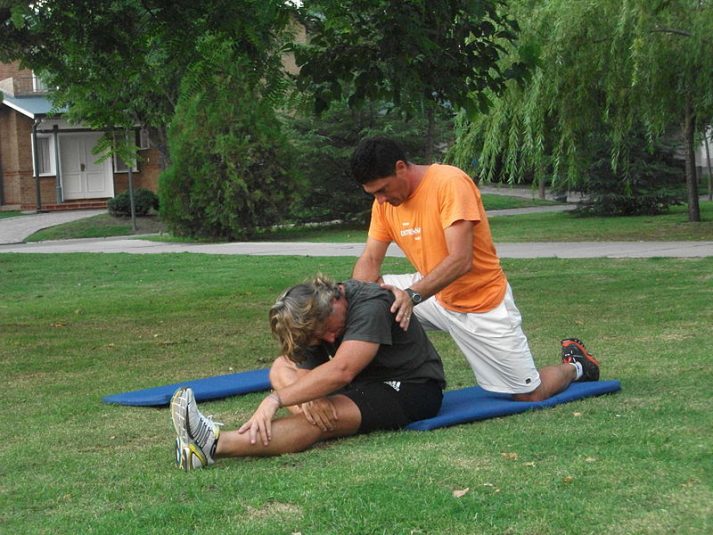

Once you find a trainer you are considering working with, the next step should always be an in-depth conversation.
MISTAKE #2: Blindly accepting what your trainer tells you without making sure you fit together!
They SHOULD do a detailed assessment to learn about you, your goals, and your story.
They SHOULD ask about any past issues with injuries or experience with exercise. If you’re injured or have any deficiencies, they should know this so they can create a great program for you.
They SHOULD be able to share past client successes with you or point to their credentials and history of success.
They SHOULD be able to describe specifically how they can help you achieve your goals. This shows an understanding of the challenges you face and how you can overcome them together.
They SHOULD set proper expectations. You won’t get ripped in a month, but they can let you know it could take many months to get in shape or build the right kind of habits.
They SHOULD take your feedback into consideration when developing a plan. They are the expert in their field, but you are the expert in your own life. Your feedback matters! [1]
They SHOULD ask you about your nutrition. If they don’t, you’ll be wasting your time. [2]
That’s what to look for. These are the things we specifically focus on with our 1-on-1 online coaching program. We love helping people in a way that fits their lifestyle, at a pace that they feel great about, while actually having fun.
What are the signs of a bad personal trainer?


Beware the “entertainment exercise” trainers with a routine that isn’t catered to your goals.
MISTAKE #3: Thinking a workout is more effective because it’s confusing or exhausting.
Many trainers just try to confuse you with needlessly complex movements and put all their clients through roughly the same cookie-cutter plan.
Why? Because they know it makes them look knowledgeable without actually needing to do something effectively:
“Now balance on this bosu ball while doing these dumbbell squat lunge curls and standing on one foot with your tongue out! Muscle confusion!
I hope you saved some energy for the rowing machine.”
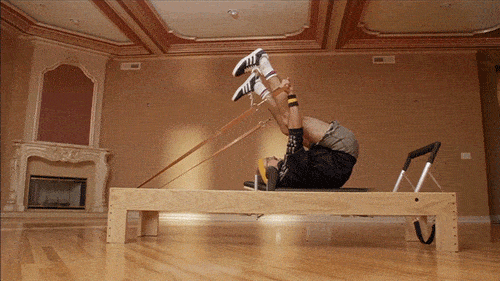

Tough workouts are great, but remember that while it’s easy to get someone tired (“Go do 100 burpees!”), it’s harder to help someone make strategic, lasting changes in their health and fitness.
Sure, it might elevate your heart rate and tire you out, but if it’s not building towards your goals in a progressive, meaningful way, what are you paying for?
They might also have just obtained a basic certification and stopped their education there, relying on ‘conventional wisdom’ rather than doing the research and building their experience.
If your trainer says any of the following phrases, run for the high hills:
- “Yeah you don’t want to squat too low – it’s bad for your knees.”
- “Yes, really throw your back into that exercise!” “
- “These (ab) exercises will burn fat from your stomach in no time” (You can’t spot reduce fat.)
- “We’ll do a new workout every session to create muscle confusion.” (That’s not a real thing.)
- “Just work through the pain, it’s fine.”
I have overheard all of these sound bites from real trainers in real gyms. Yikes.
Your trainer should be results-focused, not focused on building a confusing program so you feel like you have to keep them around.
Remember, your personal trainer works for YOU: Don’t let them build a program that doesn’t actually fit your needs!
Do the trainers customize your workout plan according to any pre-existing injuries you may have, or do they follow a standard workout plan for everyone?
Are they encouraging or helping you succeed in the way you want to be encouraged, or are they scrolling through Instagram models on their phones while you’re doing your sets?
Are they putting in the time so they can see you get results, or are they putting in the time so they can check the box and collect your money?
You’re paying money for this person’s expertise and attention – it’s not too much to ask to find somebody who takes those things seriously.


What certifications should a personal trainer have?
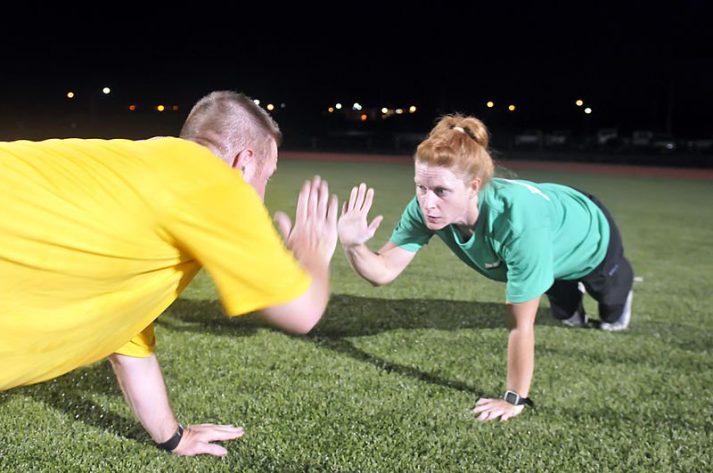

There are a wide variety of personal trainer certifications and other “credibility indicators.”
The more traditional path – a degree in exercise science or kinesiology may mean the trainer in question is knowledgeable about the human body.
However, that doesn’t speak to any experience they may or may not have coaching in real-world circumstances.
Here are 6 of the most popular personal trainer certifications:
-
- NSCA: National Strength and Conditioning Association
- ACSM: American College of Sports Medicine
- NASM: National Academy of Sports Medicine
- ACE: American Council on Exercise
- ISSA: International Sports Sciences Association
- NPTI: National Personal Training Institute [3]
T-Nation provides a rundown of the pros and cons from a trainer’s perspective that we feel is also useful insight from a client’s perspective. Be sure to check them out if you want to learn more about what’s behind your trainer’s certification.
We consider having one of these to be the baseline starting point for any trainer. It’s an indicator they care enough to put in the time and effort to get certified and insured.
While these certifications are a great starting point, specialty certifications indicate further expertise in specific areas. Many of the organizations listed above (NSCA, ACSM, etc.) offer specialty certifications in areas like nutrition, psychology of change, sports performance, and specialty populations. These are all great options.
In addition to those, there are other companies that are recognized for having great specialty certifications:
Nutrition
- Precision Nutrition
- Mac Nutrition University
Strength & Conditioning
- EXOS
- Girls Gone Strong
- Barbell Logic
- BioForce
- StrongFirst
- Training For Warriors
Mobility & Flexibility
- Functional Range Conditioning
- The Ready State
Special Interests
- GMB fitness (gymnastics)
- Titleist Performance Institute (golf)
- MovNat (natural movement)
- WFPF (parkour)
- CrossFit
A note on CrossFit certifications: CrossFit certifications are completed in a single weekend. While a CrossFit certification does not make a trainer bad (there are plenty of excellent CrossFit coaches out there!), it does not guarantee excellence either. [4]
Here are our thoughts on CrossFit.
The bottom line: there are many continuing education opportunities for trainers. Finding a trainer who invests in their education is another good sign that they take their craft seriously.
CAVEAT TO ALL OF THIS: Plenty of trainers who have NO certification are incredible, and plenty of other trainers have the most elite certifications and are terrible trainers.
This is why, even though I just spent all that time outlining certifications for you, I want you to remember Mistake #4.
MISTAKE #4: Blindly accepting a trainer’s credentials or discounting a trainer without certain credentials.
Certifications can be a starting point, but they shouldn’t be the determining factor.
One of the most important things to look for in your trainer isn’t a credential or certification at all, but real experience and an enthusiasm for helping you reach your goals.
For example:
Looking to Powerlift or get into Olympic lifting? Look for someone who actually coaches athletes who do compete!
Need to lose a lot of weight? Ask a trainer to share with you success stories from people who are like you.
In our view, finding a trainer with proven experience and a track record of performing or coaching (or both) in the area of your goals is the most valuable step you can take to ensure quality.
The credential is only a starting point.
How much does a personal trainer cost? Are personal trainers worth it?


The cost of a personal trainer can vary dramatically depending on:
- Where you live (in an expensive city, small town, etc.).
- The quantity and duration of your training sessions.
- What kind of training you are looking for.
But you want specifics.
As of April 2024, the average North American trainer charges $55-65 for an hour session.
That’s an “average” so let’s break it down a little.
An hour-long session with a trainer at an Equinox Gym in the NYC area costs $100-$150+/hour on top of their monthly membership (definitely on the more expensive end.)
On the other hand, a session with a trainer at the YMCA in Indiana costs $45-$50/hour.
Those two examples paint a pretty good picture of what you can expect based on where you live and train.
If you live in a higher-cost-of-living area, like Illinois, New York, or California, you can expect to pay prices on the higher end of the range: more like $65-$115+ per session.
If you live in a lower-cost-of-living area, like Kentucky, Nebraska, or North Dakota, you can find trainers for as low as $35-$45 per hour.
Of course, it also depends on where you train and any additional membership fees.
Here are real 2024 examples of the total monthly cost of training with a personal trainer twice a week (sessions + monthly membership fees):
-
- Global Gyms: Most big box gyms offer personal training:
- LA Fitness: $450/mo
- 24-Hour Fitness: $680/mo
- Anytime Fitness: $440/mo
- Luxury Gyms:
- Equinox: $1,000/mo
- Lifetime Fitness: $899/mo
- Crunch Fitness: $830/mo
- In-Home Personal Training: If you don’t want to head to the gym, you can actually have a personal trainer come to your home. The cost of this could be all over the place, but a rough average would be around $75-$175 per session, or $600-$1400/mo. (Though you do save on membership fees and have the convenience of working out at home.)
- Online Personal Training (done via zoom/video): This is an alternative to in-person training, and pricing can vary dramatically depending on the experience you want. Some online-trainers will literally train you via zoom, at a specific time, and thus will probably charge you by the hour like an in-person trainer.
- Online Personal Training (a monthly experience via app) For other online coaching experiences, like Nerd Fitness Coaching (hey that’s us!), the experience is asynchronous and done on your own schedule. It can contain a custom workout program, nutrition plan, and regular check-ins done throughout the month. As a result, this is usually charged monthly (a significantly smaller investment compared to somebody paying for multiple weekly training sessions).
- Global Gyms: Most big box gyms offer personal training:
Different trainers will have different qualifications and expertise, leading to vastly different training experiences.
This can be really important.
MISTAKE #5: Thinking “more expensive” automatically means “better results.”
Cost is not the right metric. VALUE is the right metric!
Depending on your goals and the results you’re after:
- $55 per session for a trainer that gives you a generic program and not a lot of oversight but helps you get started might be exactly what you need.
- $115+ per session might be a STEAL if it’s an amazing trainer who gets to know your life and your personality, motivates you in the way you need to be motivated, and helps you get past a plateau when you stall.
One isn’t necessarily better than the other.
That’s why remembering your “get in shape” goals is critical when hiring a personal trainer.
If you’re looking to do 5 sessions to improve your powerlifting technique, that’s different than hiring a trainer to be with you in person 3x a week to get you to the gym.
The cost-to-benefit ratio is different if your trainer also takes an active role in your nutrition.
After all, workouts only make up 1-3 hours per week.
What about the other 165?
In our experience, most people benefit from a trainer who also helps them with nutrition and accountability outside of the gym.
HOW TO THINK ABOUT HIRING A TRAINER:
You’re not just paying for an hour of somebody’s time.
You’re paying for their years of experience, schooling, training, and expertise.
You’re paying to outsource ALL of your fitness questions to somebody who knows what they’re doing.
Somebody who gives you the confidence you’re training correctly.


So instead of “I am paying this trainer for 1 hour, this is too expensive,” what you’re really paying for is confidence, momentum, and (hopefully) results.
How does an in-person trainer compare to Nerd FItness Online Coaching?
In addition to building you a workout program for the month, we also help you with your nutrition, behavior change, and provide ongoing guidance and accountability.
There are pros and cons to hiring an online personal trainer, so make sure you read that next section.
SHOULD I HIRE AN ONLINE PERSONAL TRAINER? WHAT ARE THE PROS AND CONS OF AN ONLINE PERSONAL TRAINER?
Here are the Pros of Online Personal Training:
#1) Freedom to fit your schedule. With an online personal coach, you can train when and where you want to fit your schedule – your coach builds the workout program for you ahead of time, so you can fit it in at your convenience.
Compare this to a traditional coach, and you’re at the mercy of their busy schedule. If they only have time Friday morning at 8 am, and you’re not a morning person, conflict ensues.
#2) Persistent worldwide accountability. I’m borrowing this phrase from an NF Coaching Client, Jeff (his success story is great). No matter where in the globe you are, your online trainer comes with you.
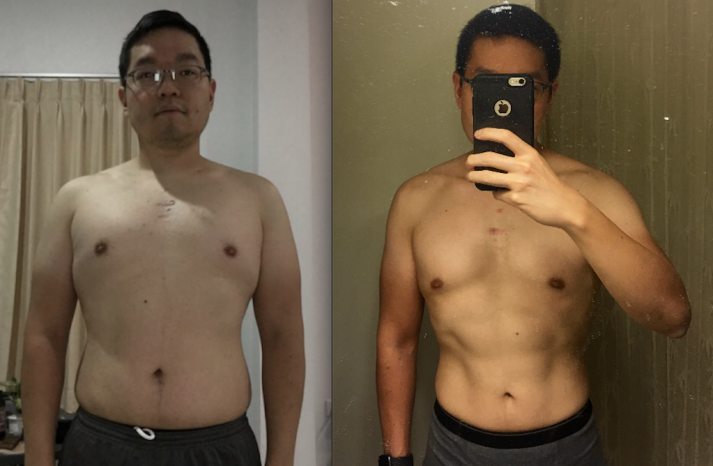

This means accountability never stops. If you travel for work, your coach can plan for that and build you a special travel routine. Getting relocated for work? No problem—your coach will still be there.
#3) Nutritional guidance. With most traditional personal trainers, you engage with them only during your scheduled visits: they help you work out and that’s about it.
With an online personal trainer, you’re connected whenever you have access to the internet. And I would imagine that MOST online coaching programs work with you on the most important part of the equation: eating healthier!
AKA everything that happens in the 23 hours outside of the gym.
#4) Potentially more cost-effective. Most in-person personal trainers are expensive, especially if you work out with them two or three times a week.
That’s because if your trainer is working with you, they can’t work with anybody else at the same time.
When you work with an online coach, because you aren’t training with them 1-on-1 in the gym, they can provide more cost-effective guidance.
When you factor in their availability via chat and their help with habits and nutrition, you’re looking at a life-changing experience if you find a coach that fits your personality.
#5) More options to find the right fit. You might not be able to find a coach that fits your goals, needs, and personality in your local area. Going online allows you to shop from a bigger pool of potential trainers!
#6) Ability to ask questions the other 23 hours of the day. You can message your coach throughout the day, and they’ll usually respond within one business day. Rather than needing to wait for your next in-person appointment, you’ll have a consistent thread of communication throughout the week that can be very motivating and help hold you accountable.
When comparing online coaches versus regular coaches, I’m going to share the cons as if you have the option between a GREAT online coach and a GREAT in-person coach.
Neither of those is guaranteed.
Here are the cons of an online coach when compared to a real-life equivalent:
#1) Your coach can’t read your mind. There’s nothing stopping you from skipping a workout and lying to your online coach that you did it. Nobody wins in this scenario, but I can totally see it happening.
You have to be willing to be open and vulnerable with your coach about what’s going on, and what you did and didn’t accomplish
#2) There is no real-time feedback or instant form check. If you’re learning how to Powerlift or you’re going for a particular heavy lift, having a coach right there is huge.
They can tell you to move your squat slightly wider, guide you through the movement, and consistently remind you—even when tired—to keep great form.
Although we do form-check videos where coaches and clients send clips back and forth, it’s not the same as having somebody critique you in real-time.
If you’re looking to nail a particularly challenging lift, or learn a dangerous gymnastics move, working with a trained professional in person is invaluable.
#3) The value of sunk cost. If you pay for a month of online coaching, there’s nothing inherently motivating you to go to the gym when it’s cold and you’re tired – your coach can’t yell at you, and you’re not letting anybody down in the moment when you don’t make it.
Compare this to working with a real coach in person.
You paid $100 for a session, and if you don’t show up, that money is *POOF* gone. So you tell yourself, “I already paid for this, and my coach is gonna be mad, I should probably go.”
And then you go. And you’re so glad that you did.


Although your online coach can notice that you haven’t signed in on your app, and they can ask what’s going on, this is after the fact compared to an in-person coach getting stood up.
There’s a lot to consider when debating in-person training vs. an online personal trainer.
I wouldn’t say one format is clearly better than or superior to another. It really depends on what you’re after and the circumstances of your situation.
MY PERSONAL EXPERIENCE: I’ve been working with an online trainer since 2014, and it’s truly been life-changing for me.
I had some goals that had evaded me despite a DECADE of effort, and it took a great coach to coax out the right strategy. It’s how I say (jokingly) that I went from Steve Rogers to Captain America.
And it was my coach’s programming that got me a 420-pound deadlift at a bodyweight of 172 pounds:
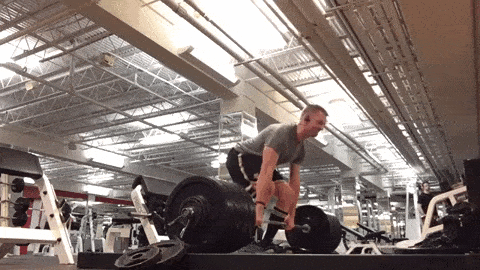

I’m not gonna set any powerlifting records, but I’m healthier, happier, and stronger each and every month, and I’m damn proud of that.
For somebody that can’t afford a top-of-the-line professional coach for each session, having an online coach to build your programming and guide your food choices is a verrrrry close second.
How to hire a personal trainer


To recap, here are the things to consider when hiring a personal trainer:
- Make sure they have the expertise to help you with your goals. Review their certifications, experience, and testimonials.
- Make sure they are a good fit for YOU. Do they offer the type of services that fit your needs? Are they the right personality fit for you?
- Talk with them about their services before signing up. Do they do a detailed assessment? Can they point to a track record of success? Do they take your feedback into account when developing a plan?
- Watch out for red flags. Do they use all-or-nothing language like “NEVER do this, or ALWAYS do this?” Do they throw around lots of terms like ‘muscle confusion’ meant to impress you with unnecessary complexity?
- Do they show a genuine enthusiasm for helping you reach your goals? If so, you’ve found someone worth hiring!
If you’ve done all this work and found someone you want to hire, we recommend you give your new personal trainer 5 sessions before making a decision that things aren’t working out (sessions are often sold at a discount in a package).
The first session is often exploratory, explanatory, and introductory, and the trainer needs to test your limits and movements to build upon that.
This isn’t a “get fit quick” strategy, but rather one that could take months and months for you to find the right person to aid you on your journey.
Don’t expect miracles in a day!
A few words of wisdom if you do hire a trainer:
DO NOT USE YOUR TRAINER AS AN EXCUSE: Too many people will hire a trainer and give no effort in the gym or the kitchen.
Then, when they fail to see results they can turn to their friends and say “My trainer is terrible, THAT’S why I’m not losing weight/getting stronger/etc.”
This happens much more often than you’d think. A trainer is a guide, like Morpheus.
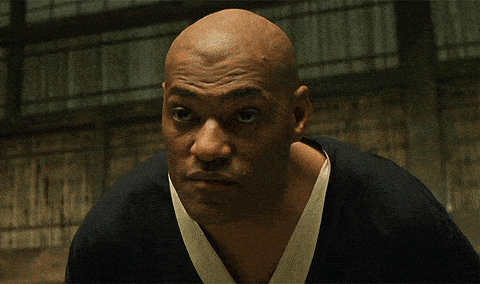

You have to take the red pill and walk through the door yourself.
MAKE CRITICISM CONSTRUCTIVE CRITICISM: When a trainer suggests a plan of action (walk every day, throw away junk food, eat a vegetable), clients often resist and offer 1,001 reasons why they can’t do that.
No compromise or discussion of possible solutions. This stinks.
Instead of saying “no,” offer an alternative solution and negotiate a plan: “I don’t really like broccoli, do you have a way to make vegetables taste better?”
In other words, don’t look for problems, look for solutions.
IF YOU ENJOY WORKING WITH YOUR TRAINER: Let them know and continue working with them.
The more information you can give them on your progress, the easier it will be for them to alter your program as you go on.
IF YOU DON’T ENJOY WORKING WITH YOUR TRAINER: That’s okay too. Not all relationships end in marriage.
Some first dates suck, and some trainers aren’t what you need.
Be honest with them and let them know that it’s not a good fit and that you will not continue to work with them.
Good trainers at this point will ask what they could have done better.
Trainers who are simply after your money may guilt trip you or beg you to stick around. Try somebody new and keep the search going.
REMEMBER: this is a lifelong quest, and you’re on the hunt for a great guide to help you on your journey.
They won’t do the work for you, and they can’t work miracles.
If you have proper expectations and do what you’re told, this could be the best investment you’ll make in your entire life!
One final note: Going to a gym is intimidating, especially if you’re starting out.
If you are in a location where there aren’t any great trainers, you don’t have access to a gym, or you’re just not ready to work with somebody in person, consider checking out our Online Coaching Program!
Schedule a free call to learn more by clicking on the image below:
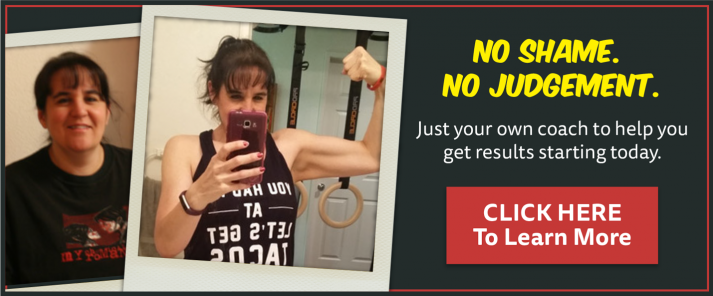

-Steve
###
photo: Decathlon, wikimedia: high five, Bicycle, Wikimedia: stretching, Amazing playground: bicycles and football






